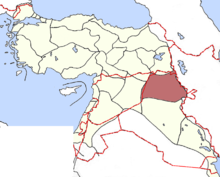
Back مشكلة الموصل Arabic مشكله الموصل ARZ Mosul mübahisəsi Azerbaijani Qüestió de Mossul Catalan Mossul-Frage German مسئله موصل Persian Մոսուլի հիմնահարց Armenian Questione di Mosul Italian Pirsa Mûsilê Kurdish Mosul-spørsmålet NB

The Mosul question was a territorial dispute in the early 20th century between Turkey and the United Kingdom (later Iraq) over the possession of the former Ottoman Mosul vilayet.
The Mosul vilayet was part of the Ottoman Empire until the end of World War I, when it was occupied by Britain. After the Turkish War of Independence, the new Turkish Republic considered Mosul one of the crucial issues to be determined by the National Pact. Despite relentless opposition from Turkey, Britain managed to bring the issue to the international scene and to scale it down to a frontier problem between Turkey and Iraq. During the negotiations for the Treaty of Lausanne, the Turkish side argued that the Kurds and Turks were not “racially separable“, and that the Arabs constituted only a minority of the population.[1] Turkey appealed for the population's right of self-determination and claimed that the majority wanted to be a part of Turkey.[1] The British responded that the Kurds were of Indo-European and the Turks of Ural-Altaic origin, and on the 4 February 1923, the parties decided that the Mosul Question would be excluded from the Lausanne Treaty negotiations.[2]
On May 19, 1924, the Istanbul Conference was held between Turkey and Britain. At the conference, the Turkish side argued that Mosul had historically always been Ottoman territory, that this situation had not changed at the end of the First World War, and that since two thirds of the population of the province consisted of Muslim Turks and Kurds, Mosul should be within the borders of Turkey for historical, military and ethnic reasons. The Istanbul Conference was dissolved after the British side steadfastly rejected Turkey's request. The dispute was taken to the League of Nations, where the Turkish side repeated their arguments and demanded a general referendum. Britain rejected that request as well, stating that the people of the region lacked a national consciousness.
The League of Nations Council appointed an investigative commission that recommended that Iraq should retain Mosul, and Turkey reluctantly assented to the decision by signing the Frontier Treaty of 1926 with the Iraqi government. Iraq agreed to give a 10 percent royalty on Mosul's oil deposits to Turkey for 25 years.
- ^ a b Ali, Othman (1997). "The Kurds and the Lausanne Peace Negotiations, 1922-23". Middle Eastern Studies. 33 (3): 521–534. doi:10.1080/00263209708701167. ISSN 0026-3206. JSTOR 4283891.
- ^ Ali, Othman (1997). p.522
© MMXXIII Rich X Search. We shall prevail. All rights reserved. Rich X Search